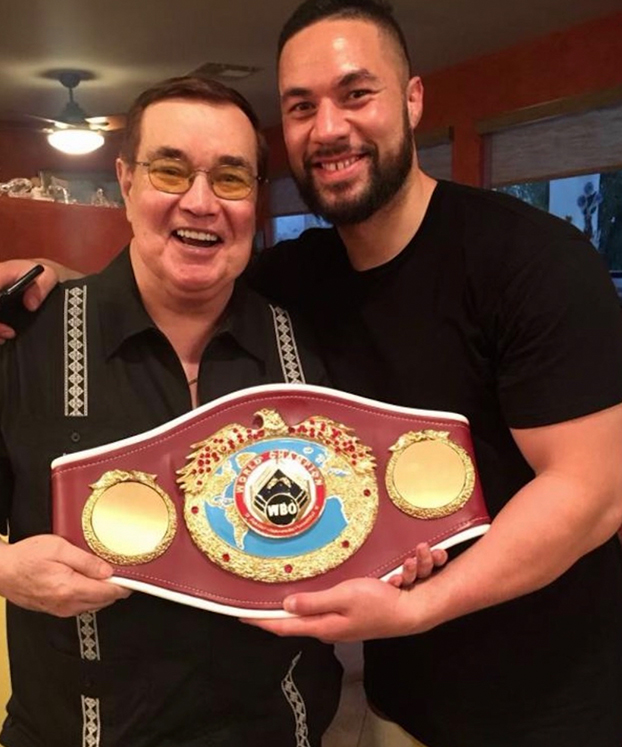
BIO


BIO
COLONEL BOB SHERIDAN HAS LIVED ONE HELL OF A LIFE.
Professional minor league baseball player, professional rodeo rider, cattle farmer in Ireland, Boston politician, and member of the Ancient and Honorable Artillery Company of Massachusetts (the oldest chartered active military organization in the Western hemisphere), the Colonel has also succeeded in becoming one of the best-known fight announcers of the past 50 years.
Recognised as the voice of Don King Productions, the Hall of Fame announcer has called over 10,000 fights on radio and television since the mid 1960’s. Throughout which time, his captivating tones have become synonymous with the some of the most historic fights in the history of the sport.
They include ‘The Rumble in the Jungle’ – the legendary showdown between Muhammad Ali and George Foreman. ‘The Thrilla in Manila’ – the iconic slugfest between Ali and Joe Frazier. And ‘The Sound and the Fury’ – the infamous rematch between Mike Tyson and Evander Holyfield, remembered today as the ‘The Bite Fight’ (a moniker coined by none other than the Colonel himself).
It was also on this night, on June 28, 1997, that the Colonel attained legendary status among his peers.
It was the night he risked it all. Suffering a heart attack the eve of Tyson Holyfield II, the Colonel – determined not to miss the global event – discharged himself from the critical care unit of the Desert Springs Hospital so that he could take his rightful place on the international telecast. With the emergency services on standby, and his own cardiologist seated next to him with a defibrillator at the ready, the beloved commentator did just that.
Now, 25 years later, the Colonel has put all his memories to page in an autobiography titled, ‘All the King’s Horses and All the Queen’s men’, leading us into the present day.
From the streets of South Boston growing up among ‘the ignorant Irish’, to the showbiz glamour of satellite broadcasting, we are taken around the world and back again in this definitive account. Along the way, the Colonel finds time to play basketball with Idi Amin in Uganda, embark on an Antarctic expedition with friends, and also survive a further nine heart attacks!
Wine, women and song is his motto. At the age of 78, and being partial to the finer things in life, the Colonel is not about to change now. There was one last surprise, though – the discovery in 2019 (following the passing of his beloved wife, Annie) of a long-lost son across the Atlantic Ocean. With two granddaughters that he desperately wants to meet, the Colonel may just be sticking around for a while longer yet.
Col. Bob Sheridan, one of the most colorful and entertaining announcers in the sport of boxing, has been known around the globe for the past 50 years, during which time he has called the action for just about every Don King promoted fight cards, including the “Thrilla in Manilla,” “Rumble in the Jungle” and “Finally: Tyson vs. Holyfield.”
Unfortunately for fight fans in the United States, for most of the Colonel’s career, he has gone unheard in America. Since he has been announcing fights for Don King’s international telecasts, the rest of the world has grown to know his voice, but not the U.S., with the exception of the moviegoers who heard his call of Muhammad Ali’s rope-a-dope upset of George Foreman in Zaire, Africa, in When We Were Kings. It is for this reason that Sheridan, who has announced over 1000 world championship fights, more than anybody in the history of broadcasting, likes to refer to himself as the “most famous boxing announcer in the world not known in the United States.”
Sheridan, however, epitomizes the truest of boxing fans. He would do just about anything to see the biggest and best fights. This was never more evident than during “The Sound and the Fury: Holyfield vs. Tyson II” on June 28, 1997. It was here where his longtime friend and WEEI (Boston, Mass.) talk show host Eddie Andelman, would say Sheridan committed one of the bravest acts of courage that I have ever witnessed.”
At 53 years of age, having already survived two heart attacks and with his weight
floating around 320 pounds, and a lifestyle to match, Sheridan did not figure he had too many great fights left. Two days prior to the fight, the Colonel suffered his third heart attack. Dr. Ram K. Singh performed an emergency angioplasty to clear one of his clogged arteries.
The following morning, after pleading with the doctors and against medical advice, Sheridan went to the MGM Grand Garden to call the fight, with his new cardiologist monitoring his progress throughout the six-hour broadcast. Singh sat right behind the Colonel, with a medical bag and defibrillator ready. The doctor also had an ambulance waiting near the back door. In case of any trouble, which of course there was, the Colonel’s bodyguard, 7-foot¬2, 500-pound, Pancho, was on hand. When the final bell rang after Tyson was disqualified for twice biting Holyfield’s ears, Pancho cleared a path for Sheridan, who was given fluids in the ambulance and underwent two more angioplasties the following morning.
“The reason I love the fight game is that it is a hustle,” Sheridan says. “Everybody is trying to hustle everybody else. But, then again, the whole world is a hustle. The thing that I love about boxing is that it is so blatant about it.”
Prior to announcing fights, Sheridan served as the voice of the Miami Dolphins from 1969-79, including the team’s perfect season in 1972. During this same period, Sheridan also called games for the University of Miami. He also moonlighted as a bull rider for eight years in the 1970s.
Sheridan earned his name of “Colonel,” as almost everyone refers to him, because he climbed to that rank in the Ancient and Honorable Artillery Company of Massachusetts, the oldest chartered military organization in the Western Hemisphere, although it is basically a historical and ceremonial company.